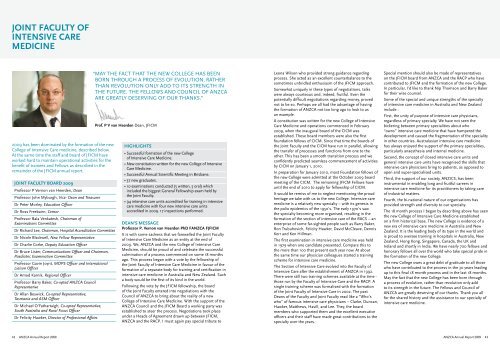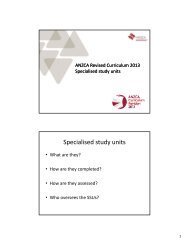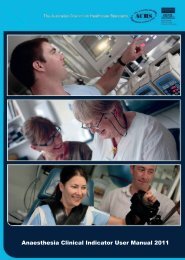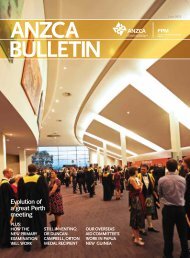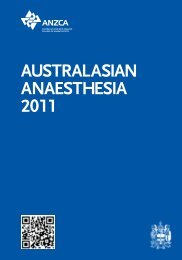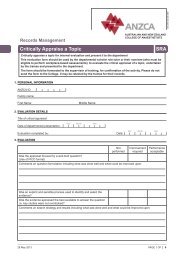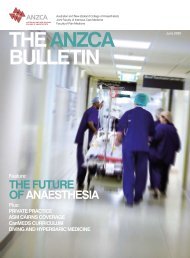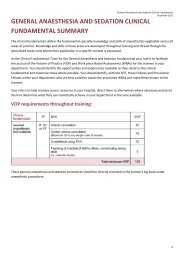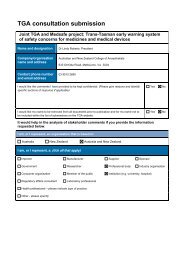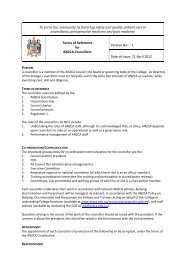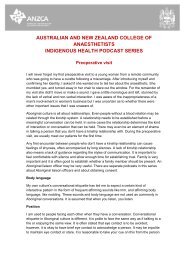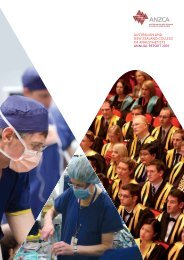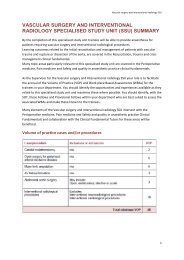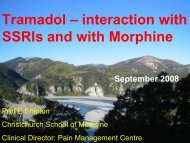Annual report 2009 - Australian and New Zealand College of ...
Annual report 2009 - Australian and New Zealand College of ...
Annual report 2009 - Australian and New Zealand College of ...
You also want an ePaper? Increase the reach of your titles
YUMPU automatically turns print PDFs into web optimized ePapers that Google loves.
Joint Faculty <strong>of</strong><br />
Intensive Care<br />
Medicine<br />
<strong>2009</strong> has been dominated by the formation <strong>of</strong> the new<br />
<strong>College</strong> <strong>of</strong> Intensive Care medicine, described below.<br />
At the same time the staff <strong>and</strong> board <strong>of</strong> JFICM have<br />
worked hard to maintain operational activities for the<br />
benefit <strong>of</strong> trainees <strong>and</strong> Fellows as described in the<br />
remainder <strong>of</strong> the JFICM annual <strong>report</strong>.<br />
JOINT FACULTY BOARD <strong>2009</strong><br />
Pr<strong>of</strong>essor P Vernon van Heerden, Dean<br />
Pr<strong>of</strong>essor John Myburgh, Vice- Dean <strong>and</strong> Treasurer<br />
Dr Peter Morley, Education Officer<br />
Dr Ross Freebairn, Censor<br />
Pr<strong>of</strong>essor Bala Venkatesh, Chairman <strong>of</strong><br />
Examinations Committee<br />
Dr Richard Lee, Chairman, Hospital Accreditation Committee<br />
Dr Nicole Blackwell, <strong>New</strong> Fellow Representative<br />
Dr Charlie Corke, Deputy Education Officer<br />
Dr Bruce Lister, Communications Officer <strong>and</strong> Chairman,<br />
Paediatric Examination Committee<br />
Pr<strong>of</strong>essor Gavin Joynt, MOPS Officer <strong>and</strong> International<br />
Liaison Officer<br />
Dr Amod Karnik, Regional Officer<br />
Pr<strong>of</strong>essor Barry Baker, Co-opted ANZCA Council<br />
Representative<br />
Dr Allan Beswick, Co-opted Representative,<br />
Tasmania <strong>and</strong> ASM Officer<br />
Dr Michael O’Fathartaigh, Co-opted Representative,<br />
South Australia <strong>and</strong> Rural Focus Officer<br />
Dr Felicity Hawker, Director <strong>of</strong> Pr<strong>of</strong>essional Affairs<br />
“May the fact that the new <strong>College</strong> has been<br />
born through a process <strong>of</strong> evolution, rather<br />
than revolution only add to its strength in<br />
the future. The Fellows <strong>and</strong> Council <strong>of</strong> ANZCA<br />
are greatly deserving <strong>of</strong> our thanks.”<br />
Pr<strong>of</strong>. P V van Heerden Dean, JFICM<br />
Highlights<br />
• Successful formation <strong>of</strong> the new <strong>College</strong><br />
<strong>of</strong> Intensive Care Medicine.<br />
• <strong>New</strong> constitution written for the new <strong>College</strong> <strong>of</strong> Intensive<br />
Care Medicine.<br />
• Successful <strong>Annual</strong> Scientific Meeting in Brisbane.<br />
• 37 new graduates.<br />
• 10 examinations conducted (5 written, 5 oral) which<br />
included the biggest General Fellowship exam held by<br />
the Joint Faculty.<br />
• 94 intensive care units accredited for training in intensive<br />
care medicine with four new intensive care units<br />
accredited in <strong>2009</strong>. 17 inspections performed.<br />
Dean’s message<br />
Pr<strong>of</strong>essor P. Vernon van Heerden PhD FANZCA FJFICM<br />
It is with some sadness that we farewelled the Joint Faculty<br />
<strong>of</strong> Intensive Care Medicine as an entity at the end <strong>of</strong><br />
<strong>2009</strong>. We, ANZCA <strong>and</strong> the new <strong>College</strong> <strong>of</strong> Intensive Care<br />
Medicine, should be proud <strong>of</strong> <strong>and</strong> celebrate the successful<br />
culmination <strong>of</strong> a process commenced on some 18 months<br />
ago. This process began with a vote by the fellowship <strong>of</strong><br />
the Joint Faculty <strong>of</strong> Intensive Care Medicine in favour <strong>of</strong> the<br />
formation <strong>of</strong> a separate body for training <strong>and</strong> certification in<br />
intensive care medicine in Australia <strong>and</strong> <strong>New</strong> Zeal<strong>and</strong>. Such<br />
a body would be the first <strong>of</strong> its kind in the world.<br />
Following the vote by the JFICM fellowship, the board<br />
<strong>of</strong> the Joint Faculty entered into negotiations with the<br />
Council <strong>of</strong> ANZCA to bring about the reality <strong>of</strong> a new<br />
<strong>College</strong> <strong>of</strong> Intensive Care Medicine. With the support <strong>of</strong> the<br />
ANZCA Council <strong>and</strong> the JFICM Board a working party was<br />
established to steer the process. Negotiations took place<br />
under a Heads <strong>of</strong> Agreement drawn up between JFICM,<br />
ANZCA <strong>and</strong> the RACP. I must again pay special tribute to<br />
Leona Wilson who provided strong guidance regarding<br />
process. She acted as an excellent counterbalance to the<br />
sometimes unbridled enthusiasm <strong>of</strong> the JFICM approach.<br />
Somewhat uniquely in these types <strong>of</strong> negotiations, talks<br />
were always courteous <strong>and</strong>, indeed, fruitful. Even the<br />
potentially difficult negotiations regarding money, proved<br />
not to be so. Perhaps we all had the advantage <strong>of</strong> having<br />
the formation <strong>of</strong> ANZCA not too long ago to look to as<br />
an example.<br />
A constitution was written for the new <strong>College</strong> <strong>of</strong> Intensive<br />
Care Medicine <strong>and</strong> operations commenced in February<br />
<strong>2009</strong>, when the inaugural board <strong>of</strong> the CICM was<br />
established. These board members were also the first<br />
foundation fellows <strong>of</strong> CICM. Since that time the boards <strong>of</strong><br />
the Joint Faculty <strong>and</strong> the CICM have run in parallel, allowing<br />
the transfer <strong>of</strong> processes <strong>and</strong> functions from one to the<br />
other. This has been a smooth transition process <strong>and</strong> we<br />
confidently predicted seamless commencement <strong>of</strong> activities<br />
by CICM on January 1, 2010.<br />
In preparation for January 2010, most Foundation fellows <strong>of</strong><br />
the new <strong>College</strong> were admitted at the October <strong>2009</strong> board<br />
meeting <strong>of</strong> the CICM. The remaining JFICM Fellows have<br />
until the end <strong>of</strong> 2010 to apply for fellowship <strong>of</strong> CICM.<br />
It would be remiss <strong>of</strong> me to neglect mentioning the proud<br />
heritage we take with us to the new <strong>College</strong>. Intensive care<br />
medicine is a relatively new specialty – with its genesis in<br />
the polio epidemics <strong>of</strong> the 1950’s. The early 1970’s saw<br />
the specialty becoming more organised, resulting in the<br />
formation <strong>of</strong> the section <strong>of</strong> intensive care <strong>of</strong> the RACS – an<br />
enterprise <strong>of</strong> some far-sighted people such as Barry Baker,<br />
Ron Trubuhovich, Felicity Hawker, David McCleave, Dennis<br />
Kerr <strong>and</strong> Ken Hillman.<br />
The first examination in intensive care medicine was held<br />
in 1979 when one c<strong>and</strong>idate presented. Compare this to<br />
the more than 100 that present each year now. At about<br />
the same time our physician colleagues started a training<br />
scheme for intensive care medicine.<br />
The Section <strong>of</strong> Intensive Care evolved into the Faculty <strong>of</strong><br />
Intensive Care after the establishment <strong>of</strong> ANZCA in 1992.<br />
There were still two training schemes available at the time -<br />
those run by the Faculty <strong>of</strong> Intensive Care <strong>and</strong> the RACP. A<br />
single training scheme was formalised with the formation<br />
<strong>of</strong> the Joint Faculty <strong>of</strong> Intensive Care in 2002. The past<br />
Deans <strong>of</strong> the Faculty <strong>and</strong> Joint Faculty read like a “Who’s<br />
who” <strong>of</strong> famous intensive care physicians – Clarke, Duncan,<br />
Hawker, Matthews, Havill, <strong>and</strong> Lee. They, the board<br />
members who supported them <strong>and</strong> the excellent executive<br />
<strong>of</strong>ficers <strong>and</strong> their staff have made great contributions to the<br />
specialty over the years.<br />
Special mention should also be made <strong>of</strong> representatives<br />
on the JFICM board from ANZCA <strong>and</strong> the RACP who have<br />
contributed to JFICM <strong>and</strong> the formation <strong>of</strong> the new <strong>College</strong>.<br />
In particular, I’d like to thank Nip Thomson <strong>and</strong> Barry Baker<br />
for their wise counsel.<br />
Some <strong>of</strong> the special <strong>and</strong> unique strengths <strong>of</strong> the specialty<br />
<strong>of</strong> intensive care medicine in Australia <strong>and</strong> <strong>New</strong> Zeal<strong>and</strong><br />
include :<br />
First, the unity <strong>of</strong> purpose <strong>of</strong> intensive care physicians,<br />
regardless <strong>of</strong> primary specialty. We have not seen the<br />
bickering between primary specialities about who<br />
“owns” intensive care medicine that have hampered the<br />
development <strong>and</strong> caused the fragmentation <strong>of</strong> the speciality<br />
in other countries. Australasian intensive care medicine<br />
has always enjoyed the support <strong>of</strong> the primary specialities,<br />
particularly anaesthesia <strong>and</strong> internal medicine.<br />
Second, the concept <strong>of</strong> closed intensive care units <strong>and</strong><br />
general intensive care units have recognised the skills that<br />
intensive care physicians bring to patients, as opposed to<br />
open <strong>and</strong> super-specialised units.<br />
Third, the support <strong>of</strong> our society, ANZICS, has been<br />
instrumental in enabling long <strong>and</strong> fruitful careers in<br />
intensive care medicine for its practitioners by taking care<br />
<strong>of</strong> industrial matters.<br />
Fourth, the bi-national nature <strong>of</strong> our organisations has<br />
provided strength <strong>and</strong> diversity to our specialty.<br />
The 18 month process I began by describing above has seen<br />
the new <strong>College</strong> <strong>of</strong> Intensive Care Medicine established<br />
on a firm historical base. The new <strong>College</strong> is evidence <strong>of</strong> a<br />
new era <strong>of</strong> intensive care medicine in Australia <strong>and</strong> <strong>New</strong><br />
Zeal<strong>and</strong>. It is the leading body <strong>of</strong> its type in the world <strong>and</strong><br />
is proud to oversee training in hospitals in Australia, <strong>New</strong><br />
Zeal<strong>and</strong>, Hong Kong, Singapore, Canada, the UK <strong>and</strong><br />
Irel<strong>and</strong> <strong>and</strong> shortly in India. We have nearly 700 fellows <strong>and</strong><br />
honorary fellows all over the world who take special pride in<br />
the formation <strong>of</strong> the new <strong>College</strong>.<br />
The new <strong>College</strong> owes a great debt <strong>of</strong> gratitude to all those<br />
who have contributed to the process in the 30 years leading<br />
up to this final 18 month process <strong>and</strong> in the last 18 months.<br />
May the fact that the new <strong>College</strong> has been born through<br />
a process <strong>of</strong> evolution, rather than revolution only add<br />
to its strength in the future. The Fellows <strong>and</strong> Council <strong>of</strong><br />
ANZCA are greatly deserving <strong>of</strong> our thanks. Thank you all<br />
for the shared history <strong>and</strong> the assistance to our specialty <strong>of</strong><br />
intensive care medicine.<br />
42 ANZCA <strong>Annual</strong> Report <strong>2009</strong><br />
ANZCA <strong>Annual</strong> Report <strong>2009</strong> 43


